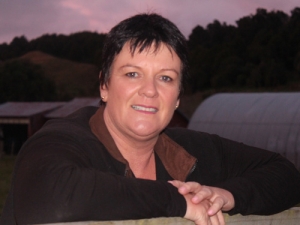State of the Dairy Nation 2024/25: DairyNZ Highlights Record Milk Production and Export Growth
DairyNZ's chief executive Campbell Parker says the 2024/25 dairy season reinforces the importance of the dairy sector to New Zealand.
 Lisa Hicks (pictured) beat fellow finalists Tracey Collis from Eketahuna and Katrina Simpson from Hokitika to the award.
Lisa Hicks (pictured) beat fellow finalists Tracey Collis from Eketahuna and Katrina Simpson from Hokitika to the award.
Passing on what Lisa Hicks has learned about dairying in the past nine years has led to her winning the Dairy Community Leadership Award.
Hicks, who with her partner Graeme Sorensen manages an 800 cow 400 hectare dairy farm in Ohakune, received the Dairy Women's Network award this week at the organisation's annual conference in Hamilton.
Hicks, the Dairy Women's Network Manawatu Regional Group Convenor, helped establish the Ohakune DairyNZ on farm discussion group and hosted local and international agri students from Land Based Training, PGG Wrightson, Massey University as well as gateway students from Ruapehu High School and she regularly holds on farm field days to share what dairy farming is about to urban children.
Students who had been in trouble with the law turned their life around through visits to Hicks farm where she mentored them.
"I took them under my wing and encouraged them how to start in the dairy industry," Hicks said. "I have been doing this for the last six years voluntarily."
During that time she has also worked with international students,
"Through word of mouth three Japanese students came over for eight weeks learning to milk the New Zealand way . . . "
The Dairy Community Leadership Award recognises a dairying woman who is making a significant contribution in her rural community, through leadership and support. The selection panel consisted of four judges including two representatives from the network.
Hicks was raised on a Hawke's Bay sheep and beef farm, but switched to dairy farming in 2007. She and her partner milk 520 cows whilst studying for their National Certificates in Dairying, supplementing their learning with workshops and discussion groups.
Hicks became a contract milker of 135 cows in Woodville in the 2009-10 dairy season, and then a 50/50 sharemilker in Rongotea for four years. By 2013 she had complemented her agriculture management adult teaching certificate, level 5.
Today she has completed her studies through to Level 5 National Diploma in Agribusiness Management. Her vision, with Sorensen, is to purchase their own dairy farm and assist others to excel through a supportive environment in on-farm training and skill development.
A remarkable feat for someone with dyslexia.
"I see myself as a mentor for people who have difficulties in the reading and writing of learning as I am a proven example of how to deal with this, teaching people new skills."
Dairy Women's Network chief executive Zelda de Villiers said Hicks' award was well earned.
"Lisa has an amazing ability to mentor, connect and inspire across generational, cultural and language barriers," de Villiers said.
"She is a lifelong learner that sets high standards for herself and others. Her inclusiveness and natural warmth is a credit to her and her tenacity and drive for education despite having dyslexia is an inspiration to us all. Hicks won a Community and Enterprise Leadership Foundation (CELF) scholarship which she will complete over nine months, thanks to sponsorship from national Hamilton based law firm Tompkins Wake.
Hicks beat fellow finalists Tracey Collis from Eketahuna and Katrina Simpson from Hokitika to the award.
"As a founding sponsor of the CELF program, Tompkins Wake has committed to building leaders and creating stronger and more prosperous communities, investing $75,000 over three years to support six aspiring leaders through CELF," said chief executive Jon Calder.
"Our firm has a strong agribusiness practice, with clients spread across the agri supply and value chain. Our sponsorship with DWN recognises the importance of education, support and knowledge sharing, and we are proud to be supporting the Dairy Community Leadership Award in 2016."
ASB is a co-sponsor of the award.
Past winners are Chris Paterson (2014) and Rachael Nicholson with Jo Sanford (2015).
Dairy Community Leadership Awards criteria
The judging panel gave consideration to the following qualities when awarding the Dairy Community Leadership Award:
• The entrant demonstrates leadership in her local community.
• The entrant makes a significant contribution to her local community and plays an active role in community organisations and events.
• She encompasses the values of Dairy Women's Network (innovation, commitment, inclusivity, credibility and integrity) and is a good representative for the organisation.
• She is an active and supportive member of Dairy Women's Network, taking part in all manner of regional group events, as well as national initiatives.
• Her contributions have made a positive difference in her local dairy community.
The Meat Industry Association of New Zealand (MIA) today announced that Chief Executive Officer Sirma Karapeeva has resigned from the role.
The winners of the 2026 Hawke’s Bay/Wairarapa Dairy Industry Awards were announced at the annual awards dinner held at Copthorne Solway Park in Masterton on Thursday evening.
Environment Southland is welcoming this week’s decision by the Environmental Protection Authority (EPA) to approve the release of Blaptea elguetai, a leaf‑feeding beetle that will help control the highly invasive Chilean flame creeper.
This March, the potato industry is proudly celebrating International Women’s Day on 8 March alongside the International Year of the Woman Farmer, recognising the vital role women play across every part of the sector — from paddocks and packhouses to research, leadership, and innovation.
Fruit trader Seeka posted a record profit and returns to shareholders in 2025.
Recent weather events in the Bay of Plenty, Gisborne/Tairawhiti, and Canterbury have been declared a medium-scale adverse event.
OPINION: Staying with politics, with less than nine months to go before the general elections, there’s confusion in the Labour…
OPINION: Winston Peters' tirade against the free trade deal stitched with India may not be all political posturing by the…